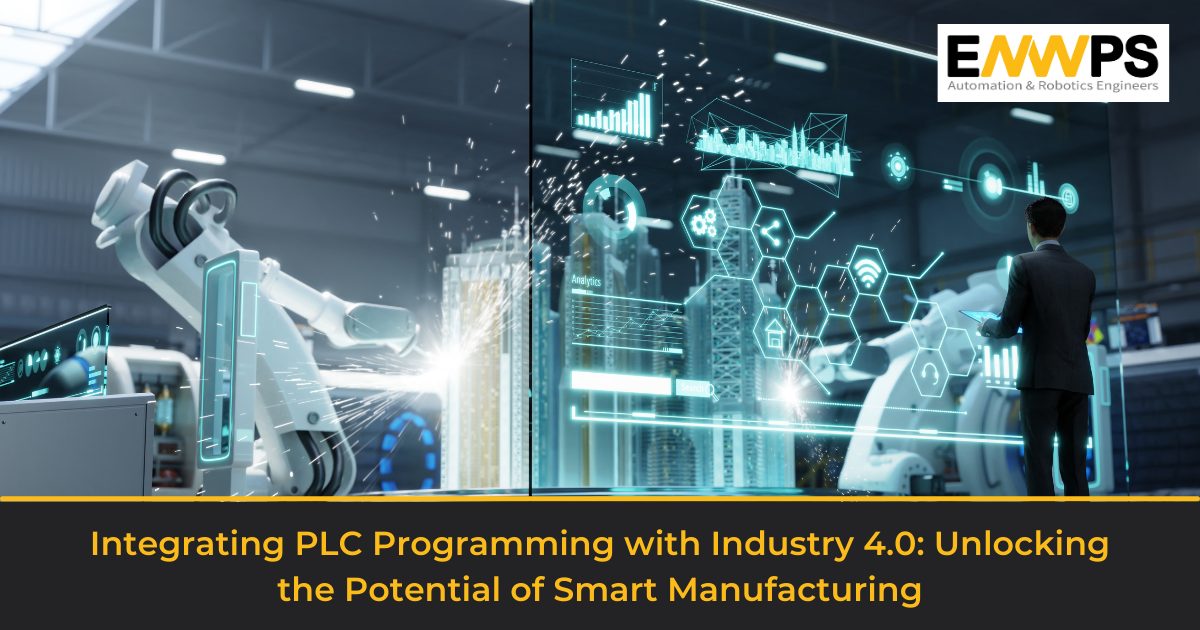Integrating PLC Programming with Industry 4.0: Unlocking the Potential of Smart Manufacturing


Industry 4.0 is the trend toward advanced automation and data exchange between industrial processes and technologies which include IoT, CPS, cloud computing, etc. Programmable logic control (PLC) and supervisory control and data acquisition (SCADA) also play major roles in advanced automation ⁴. In this article, we will explore the potential of integrating PLC programming with Industry 4.0 to unlock the potential of smart manufacturing.
Industry 4.0 and PLC Programming
Programmable logic controllers (PLCs) are an established platform, widely used throughout industrial automation. This settled technology persists throughout industry due to its strengths and weaknesses in the dominant programming styles for today’s PLC-based automation systems.
As we proceed to industry 4.0, it doesn’t only provide software systems that promote automation, but also requires equally potent hardware. For that, industries have been introducing themselves to newer generations of sensors, i.e., sensor 4.0. This advancement in technology is the best example for how controlling devices and other related hardware are preparing towards Industry 4.0.
Smart Manufacturing: Benefits and Challenges
Smart manufacturing is accelerating, and strategies are nascent. This research illustrates the benefits and challenges across different stages of smart manufacturing strategy. Manufacturing operations leaders should use this research to improve initiative planning, avoid misalignment and gain competitive advantage.
Smart manufacturing, also known as Industry 4.0 or the Industrial Internet of Things (IIoT), brings together advanced technologies and data-driven approaches to transform traditional manufacturing processes. Here are some benefits and challenges associated with smart manufacturing:
Benefits of Smart Manufacturing:
1. Increased Efficiency
2. Enhanced Quality Control
3. Improved Flexibility and Agility
4. Predictive Maintenance
5. Supply Chain Optimization
6. Cost Reduction
Challenges of Smart Manufacturing:
1. Security Risks
2. Skill and Workforce Development
3. Interoperability and Standardization
4. Data Management and Analytics
5. Legacy System Integration
6. Initial Investment and ROI
The Role of PLC Programming in Industry 4.0
In Industry 4.0, the role of Programmable Logic Controllers (PLCs) remains vital but evolves to meet the demands of advanced manufacturing processes. Here are some key roles of PLCs in Industry 4.0:
– Automation and Control: PLCs continue to serve as the core automation and control devices in Industry 4.0. They manage and execute control logic to monitor and regulate industrial processes, ensuring precise and reliable operation of machinery, equipment, and production lines.
– Data Collection and Integration: PLCs in Industry 4.0 are equipped with advanced communication capabilities and connectivity features. They collect real-time data from sensors, actuators, and other devices, facilitating the integration of data across the industrial ecosystem.
– Connectivity and Interoperability: PLCs act as key components in creating connected and interoperable systems within the Industrial Internet of Things (IIoT). They enable seamless communication and data exchange between various devices, machinery, and systems, fostering a connected manufacturing environment.
– Edge Computing and Analytics: PLCs in Industry 4.0 are increasingly equipped with edge computing capabilities. They can process and analyze data locally, enabling real-time decision-making at the edge of the network. This reduces latency and allows for faster response times in critical industrial processes.
– Integration with Cloud and Big Data: PLCs play a crucial role in bridging the gap between the shop floor and the cloud-based data analytics platforms in Industry 4.0. They can transmit relevant data to the cloud, enabling comprehensive analysis, predictive maintenance, and optimization of manufacturing processes using big data analytics.
As a result, PLC controllers can be integrated seamlessly in Industry 4.0 production environments using the service paradigm. The transmission time for the process data from the PLC to the IP network was determined for a prototype implementation.
Conclusion
In conclusion, integrating PLC programming with Industry 4.0 has the potential to unlock the potential of smart manufacturing by enabling seamless integration of PLC controllers in Industry 4.0 production environments using the service paradigm. This will allow for more efficient transfer of process data from the controller to an IP network and enable outsourcing parts of the control program to a cloud.
Talk to us today! Reach us on automation@enwps.com